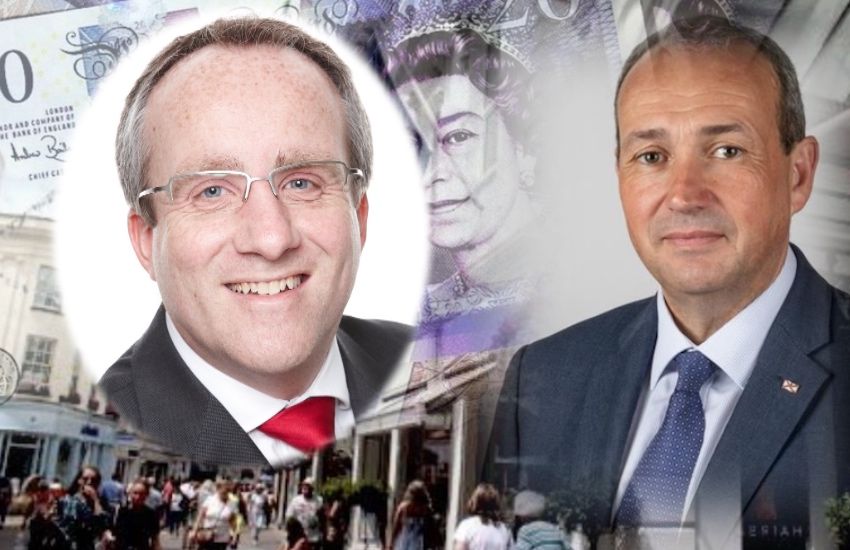

Newly released government letters show that senior officers, including the former Chief Executive Charlie Parker, didn't agree that some of the schemes to help businesses being hit by covid restrictions, would deliver value for money.
Official documents, known as Letters of Instruction, have now been published, and show the procedural steps Ministers had to go through to get their decisions put into place.
They detail serious concerns at the highest levels of Government's with two of the main measures put in place to support the island's businesses, with officials warning of a post-pandemic recession closing businesses even if they had received covid support, and businesses owners going to the government for help rather than putting in their own cash.
The letters are part of the procedure to be followed when an accountable officer has concerns with a Minister's decision: they must set out those concerns in writing, and ask that, if the Minister still wishes to proceed, they issue a formal ‘letter of instruction.'
Fixed Costs Scheme
On 8th February 2021, the Acting Director General for the Economy, Richard Corrigan, wrote to his Minister, Senator Lyndon Farnham setting out a wide range of concerns with the already announced Fixed Costs Support Scheme.
The letter shows that Mr Corrigan challenged one of the schemes objectives, which was "To effectively secure Jersey’s economic infrastructure" as he argued a recession is likely to follow the pandemic, and therefore some of the businesses taking support funding, will still go bankrupt:
"It is debatable whether these could be considered in an infrastructure sense given their relative individual scale and whether they have sufficient momentum to see the island through a probable recessionary phase that follows on from the pandemic. During a recessionary period it is highly likely that discretionary consumer spending will reduce and an uncertain number of the businesses ‘secured’ through this funding will suffer insolvency at that point."

Pictured: Mr Corrigan argued that with a recession potentially following the pandemic, some of the supported businesses may go under anyway.
He also argued the support could go to some businesses who didn't need it, and noted that small businesses "suffer from weaker business and financial management" which may make them "more prone to failure in periods of economic difficulty through limited forward planning, risk insurance, business continuity planning and financial resilience, including access to a broader range of new capital sources."
Mr Corrigan goes on to estimate that potentially up to 2,000 businesses, "...have suffered a significant loss of trade from forced closure and some will go on to suffer continued financial detriment through ongoing measures such as physical distancing and limits on gatherings."
For that reason, he argues that officers cannot properly assess the value for money delivered by the proposed scheme, and how effective it would be.
"There are further value for money risks around the extent to which funding will go to some businesses who are otherwise able to adapt their business or where the business owner could seek employment. An example of this can be seen in the private catering businesses that have made representations for support at a time when it is also being represented that restaurants are seeking qualified chefs as they come close to a re-opening date."

Pictured: officials estimated up to 2,000 businesses have been hit by the pandemic.
He goes on to argue that some businesses may claim money from the scheme, when they could have got support from another source, such as a bank or a shareholder, concerns which he says were shared by the-then Government Chief Executive, and Principal Accounting Officer, Charlie Parker, who was worried about...
Mr Corrigan noted that some of the problems he set out were also present in other support schemes, but in those cases, the economic case for going ahead was "more robust." Finally he was worried about how the scheme would actually be implemented:
"There are also risks around the full feasibility of this scheme, given the operational difficulties in trying to administer efficiently and effectively a new scheme during a pandemic and at the pace which is needed to support businesses. The need for timely subsidy payments to a large and broad number of businesses does not lend itself to the in-depth financial analysis of a business that would generally be associated with any investment on commercial terms, or for example a grant to an Arm’s Length Body. Accordingly an automated approach to processing payments, as taken with the Co-Funded Payroll Scheme, policed by declarations, increases the risk of error and fraud."
The Minister's response to his letter was sent later the same day, and instructs Mr Corrigan to go ahead with the scheme, immediately.
"The economic damage from Covid-19 continues to create a strong case for this scheme. I acknowledge the risks highlighted in your letter but I believe there is an urgent and overriding need to provide additional support to businesses," he said.
Businesses later argued that the criteria for entry to the scheme were too stringent.

Pictured: Pictured: events businesses have been some of the worst hit.
The Visitor Attractions and Events Scheme (VAES)
On 14th December, Mr Corrigan wrote to Senator Farnham to express his concerns with the value for money delivered by a scheme for attractions and events businesses. Specifically, he drew attention to:
He also mentions that Government CEO, Charlier Parker, "...holds personal reservations around need, scheme coverage and economic rational."
After being instructed to go ahead with the scheme, very few businesses then applied to it, saying the complex criteria for entry made it not fit for purpose - that prompted changes such as reducing the barrier of needing an annual turnover of at least £300k a year.
Once again Mr Corrigan wrote to his Minister to raise concerns, this time with the changes being suggested, on the 9th March.
In this letter, he cites Mr Parker's (the Principle Accounting Officer, or PAO) concerns about value for money:
"The PAO has significant reservations about the value for money of the Scheme as has been previously highlighted. As a consequence of the revisions to the scheme, he too believes that the lowering of the turnover threshold to £150,000, means that a range of businesses that are now eligible were not the primary focus of the original scheme and not necessarily long term a key part of the sector’s base infrastructure.
"As a result, such operators can avail themselves of other support provided by the Government. He is also of a view that these changes mean that government will be the funder of first resort rather than last: a position that will potentially see the unnecessary draw down of Public resources when alternative funding should have been targeted first."
The letters have been published after Senator Kristina Moore asked the Chief Minister how many ‘letters of instruction’ had to be issued since the 2018 election.
They are used when an Accountable Officer – the individual within a department personally responsible for its running and finances, which is usually the Director General – has concerns with a Minister’s decision. Those concern could be around value for money, as they have to ensure that the Department’s use of resources is appropriate and is consistent with the requirements as set out in the Public Finances Manual. Or they might be being asked to exceed agreed budgets, which could contravene Article 15(1) of the Public Finances (Jersey) Law 2019.
They must set out their concerns in writing, and ask that, if the Minister still wishes to proceed, they issue a formal ‘letter of instruction’. A copy of this is then sent to the Government's spending and governance watchdog, the Comptroller and Auditor General, and the Accounting Officer is not then seen to be personally responsible for it.
Comments
Comments on this story express the views of the commentator only, not Bailiwick Publishing. We are unable to guarantee the accuracy of any of those comments.